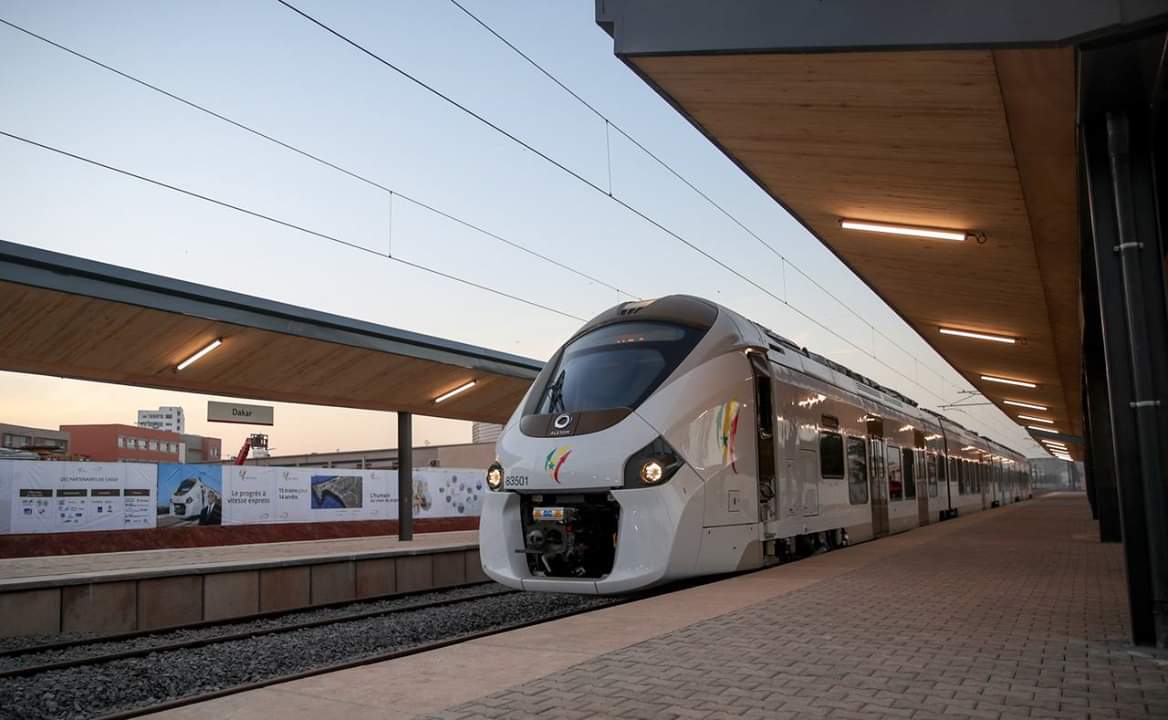The Dakar Regional Express Train TER project got a shot in the arm when during the Council of Ministers held on the 2nd of February 2022, President Macky Sall instructed the ministries concerned to undertake with the technical and financial partners the necessary due diligence for the start of work on the 2nd phase.
This comes barely two months after the first phase of the TER, which is one of the flagship projects of the Emerging Senegal Plan (PSE) initiated by the President of the West African Country, began commercial services.
Also Read: Pont de Foundiougne the Longest Bridge in Senegal, Opened to Traffic
Covering a distance of approximately 36km from Dakar station to Diamniadio and crossing a total of 18 communities/boroughs with about 13 stations, this phase was launched back in December 2016.
Overview of the 2nd phase of the Regional Express Train in Senegal
The 2nd phase of the Regional Express Train in Senegal will be carried out on a 22 km stretch between Diamniadio and Blaise Diagne International Airport.
A total of US$ 113M has been committed for the implementation of this phase by the Islamic Development Bank (IDB), an international financial institution that aims to foster the economic development and social progress of member countries and other Muslim countries.
Upon the completion of this phase, one station and 7 trains will be added bringing the total number of stations on the entire route to 14, and the total TER fleet to 22 trains.
The objective of the TER
Generally, the TER aims to decongest the roads of Dakar, the capital of the West African country that record large flows of vehicles on a daily basis and significant traffic jams, especially during the morning and evening rush hours.
According to statistics from the African Development Bank, a multilateral development finance institution headquartered in Abidjan, Ivory Coast, there is a need to serve 124,000 passengers during the morning peak hours only, which the operational part of the TER does not meet.
The second phase is expected to bridge this gap.
Background
The implementation of the TER project which is a part of the economic development plan of Senegal and which aims to offer services for the Dakar suburbs by replacing Petit Train de Banlieue (PTB), commenced in December 2016 in two phases.
The first section involved the upgrade of the 36km-long existing infrastructure between Dakar and Diamniadio stations, while the second phase involves the construction of a new 19km-long railway line between Diamniadio station and the AIBD that is expected to transport approximately 115,000 passengers a day when it becomes fully operational.
The new railway line will also replace the existing rail facilities and will have provision for the installation of four future tracks. An electrified double-track with a standard gauge for passengers and a metric track for freight will also be built as well as a maintenance and service track that can be converted into a fourth track in the future.
When operational, the entire project will link Dakar with AIBD in 45 minutes through a 55km-long track passing through 14 stations.
Project Timeline
What we reported in May 2021
The first phase of Dakar Regional Express Train (TER), a railway line being built to connect Dakar city center with Blaise Diagne International Airport (AIBD) in Senegal, is expected to start operations by the fourth quarter of this year.
This is after President Macky Sall, asked the Minister of Infrastructures, Land Transport, and Opening up during the recent council of ministers meeting to ensure the lifting of all the constraints related to the commercial exploitation of the TER, at the latest in November 2021.
Once operational, this phase which is 36km-long, will connect the center of Dakar to the new business town of Diamniadio, in 35 minutes, crossing the entire outskirts of the capital.
December 2021
The first phase of the Regional Express Train (TER) in Senegal, which is one of the flagship projects of the Emerging Senegal Plan (PSE) initiated by the President of the West African Country, His Excellency Mr. Macky Sall, has begun commercial services after approximately five years of construction and preparation.
The project, which covers a distance of approximately 36km from Dakar station to Diamniadio, crossing a total of 18 communities/boroughs was launched back in December 2016.
Scope of the 1st phase of Senegal’s Regional Express Train (TER) project
The project involved detailed studies and installation work for a two-track UIC 1435 mm railway platform, construction, and restoration of new and old stations as well as rail and road bridges, hydraulic structures, and footbridges.
Also Read: Dakar – Saint-Louis highway project in Senegal forges ahead
It also included survey, supply, and installation of all the technical systems of the project including railway signaling, power supply system (substation, catenaries, etc.), telecommunications, and passenger information and ticketing.
With a frequency of 6 trains per hour (one train in every 10 minutes) and a top speed of 160 km/h, the now commissioned TER will carry up to 115,000 passengers a day on a total of 15 dual-mode self-propelled trains (both electric and diesel traction) of the CORADIA brand.
Each train consists of 4 cars with the capacity to accommodate up to 565 passengers and will offer WIFI, multimedia, comfort (1st and 2nd class), air conditioning, storage, and lighting on board.
The TER will serve 13 stations and stops between the suburbs of Dakar and the new city of Diamniadio.
The second phase of the TER
While commissioning the 1st phase of Senegal’s Regional Express Train (TER), president Macky Sall announced the upcoming start of the second phase of the project that is over 22km long between Diamniadio and Blaise Diagne de Diass international airport.
One station and 7 trains will be added as part of this project bringing the total number of stations on the entire route to 14 and the total TER fleet to 22 trains.
